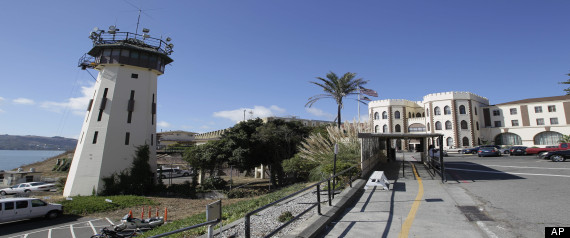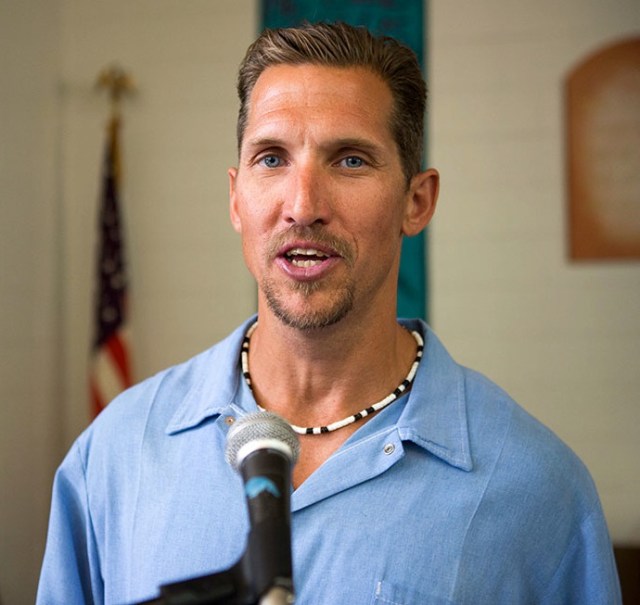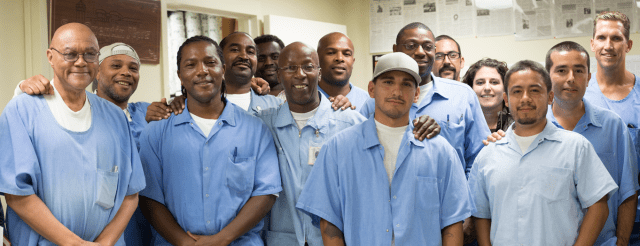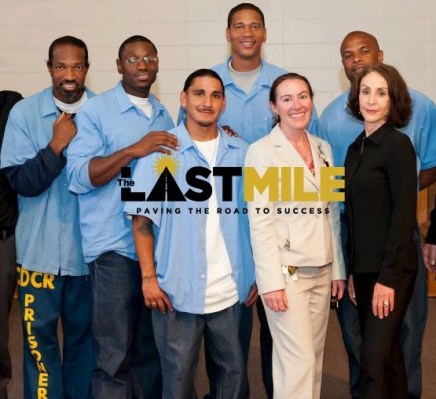Barbed wire and armed guards aren’t your typical intro to a startup pitch event. But today, San Quentin Prison hosted The Last Mile demo day featuring presentations by seven inmates. The Last Mile hopes that through entrepreneurship, it can prepare convicts for employment and reduce recidivism. Considering these founders have never used the Internet or an app, their business plans were remarkable.
“It makes me feel like I’m already contributing to society” said Crisfino Kenyatta Leal, one of the first inmates to go through The Last Mile who presented at its first demo day in 2012. The program was set up by accelerator KickLabs, and funded by its founders Chris Redlitz of AdAuction and Beverly Parenti of First Virtual holdings, two succesful 90s tech companies. Investors, entrepreneurs, and authors like First Round Capital’s Josh Kopelman, MC Hammer, and AllTop’s Guy Kawasaki come in to mentor the inmates. Though these captive founders aren’t looking for funding now, many hope to launch their businesses once they earn their freedom.

Cell Block Startups
“IDs!” the guard at the first checkpoint yelled. He yelled a lot of things, leading me to assume working at a prison is a great job if you enjoy raising your voice. As I got escorted across San Quentin’s scenic bay-side compound, I was assured the inmates do not have an ocean view. My passport was triple-checked and I got shuffled through the iron gate airlock into the prison itself.
An all-prisoner jazz band swung through a few jams in the on-site church before Redlitz gave an opening speech, explaining that Last Mile participants have to show years of dedication to their education before being admitted to the program. After a quick inspirational rap song from two more inmates, the first of the founders took the stage.
 What was immediately clear was how much these men had practiced. When Chris Schuhmacher presented his plan for Fitness Monkey, a startup aimed to help drug abusers replace substances with “a healthy addiction to fitness,” he looked more polished than many Y Combinator companies I’ve seen demo. Schuhmacher cited statistics, framed his market, walked through the app he envisioned, and rattled off one-liners like “Fitness Monkey is the product of my life, and my life sentence.” If delivered elsewhere, you probably wouldn’t have guessed Chris was convicted of second-degree murder.
What was immediately clear was how much these men had practiced. When Chris Schuhmacher presented his plan for Fitness Monkey, a startup aimed to help drug abusers replace substances with “a healthy addiction to fitness,” he looked more polished than many Y Combinator companies I’ve seen demo. Schuhmacher cited statistics, framed his market, walked through the app he envisioned, and rattled off one-liners like “Fitness Monkey is the product of my life, and my life sentence.” If delivered elsewhere, you probably wouldn’t have guessed Chris was convicted of second-degree murder.
Eddie Griffin, in San Quentin for cocaine possession, pitched an app called “At The Club” that lets jazz music fans stream concerts. Art Felt Productions from second-degree murderer Tommy Winfrey gives prisoners a way to sell their art on sites like eBay and Etsy despite being banned from the Internet. Heracio Harts, serving 10 years for manslaughter, devised a plan to fight urban obesity by turning abandoned homes into urban centers that host farmers markets and exercise spaces.
Occasionally, the fact that the inmates could only read about new technologies but not actually use them detracted from their startup plans. Several planned to use QR codes, which seem like a good idea, but no one actually scans. Darnell Hill, who is serving 10 years to life for robbery and kidnapping, laid out a plan for a mobile app to treat victims of post-traumatic stress disorder. He was betting QR code wristbands could drive downloads.
Several of the ideas centered around keeping people out of jail. The inmates seemed eager to prevent others from sharing their fate.
Schumacher explained that drugs and alcohol play into the crimes of over 80 percent of people incarcerated in the U.S. He hoped to shift addicts onto a “runner’s high” to keep them on the straight and narrow. Larry Histon, serving 29 years to life for first degree murder, proposed a company called TechSage which would turn newly released ex-cons into mobile app developers so they’d have jobs and stay out of prison. Histon granted that “the world has changed in 18 years” since he was sentenced. A former IT professional, Histon tries to stay current by getting his hands on tech magazines like Computer World and Information Week, which inmates are allowed to have.
Innovating Without The Internet
Rather than the impressive quality of the pitches, it was the fact that prisoners are not allowed to use the Internet directly that was most surprising. That the U.S. spends $50,000 a year to incarcerate people, but won’t give them access to a learning tool with infinite potential was downright depressing. The web could give convicts a chance to learn skills that could earn them jobs once they’re out. Last Mile co-founder Beverly Parenti lamented that “20 years in prison cost $1 million, but inmates are released with no training.” That leads many to wind up back in jail. “It’s a really bad investment,” Parenti tells me.
Despite the barriers, San Quentin’s inmates do their best to participate in the digital world. They’re allowed to fill out “tweet sheets” which volunteers can then type in to let the prisoners use Twitter. They love to read print-outs or paperback copies of popular ebooks like Brian Solis’ “The End Of Business As Usual”. The Last Mile even set up a program to get inmates on Quora, which has spawned some of the knowledge base’s most fascinating content. Winfrey’s heartbreaking answer to “What does it feel like to murder someone?” has received almost 2,500 upvotes. But he’s never surfed the site; he’s required to submit answers on paper that are entered by someone else.
If inmates were allowed to use the Internet, they’d obviously need to be monitored, and perhaps barred from direct communication. Still, just the ability to passively browse certain parts of the web could make prisoners feel less isolated, and more ready to eventually rejoin the world. At least one of the convicts who presented today, though, came up with a brilliant business plan without the web.
Jorge Heredia started his presentation by saying “I’m here to tell you even produce deserves a second chance.” Before going to prison for attempted murder, Heredia discovered that tons of fresh produce that is perfectly good to eat is thrown away because it doesn’t look good enough to sit on a grocery shelf. He tells me in his first experiment in the business “I bought $375 of onions that would have been thrown away. I packed them in my truck, went door-to-door selling them to local restaurants, and came back with $1,500.”
After 15 years behind bars, he wants to return to #2 produce-selling with a company he calls The Funky Onion. It plans to buy bruised fruits and vegetables for cheap, and sell them to businesses that don’t are about their appearance since they’ll be diced or canned anyways. Heredia’s also got a plan for a mobile app that educates people about the nutritional value and low prices of #2 produce, plus shows them where to buy it. The app even has a great viral hook: It encourages users to share photos of the “funkiest looking produce” they find.
As the presentations ended and the jazz band kicked up again, it was beautiful to see the founders getting patted on the back in congratulations by their fellow inmates. There was a distinct vibe of “at least you’re going to make it out of here”.
The Last Mile plans to eventually expand to other prisons beyond San Quentin and inspire similar entrepreneurship programs across the country. They have the potential to not only get prisoners back on track to being productive members of the community, but also to inject fresh ideas into technology. “Their ideas haven’t been corrupted by others’ approaches. In here your mind can just roam,” says Tulio Cardozo. After seven years in prison, he joined up with KickLabs upon release to mentor Last Mile participants while building his own program called Collaborative Benefit, which is like a LinkedIn for former inmates.
The tech world is supposed to embrace failure as long as it’s followed by hard work. Collaborative Benefit and The Last Mile hope that the we can see past what prisoners have done in the past, and give them a chance to redeem themselves. In his blue prison jumpsuit from the front of the stage, Leal urged, “If you treat a man as he can and should be, he’ll become what he can and should be.”
[Image Credit: AP]
